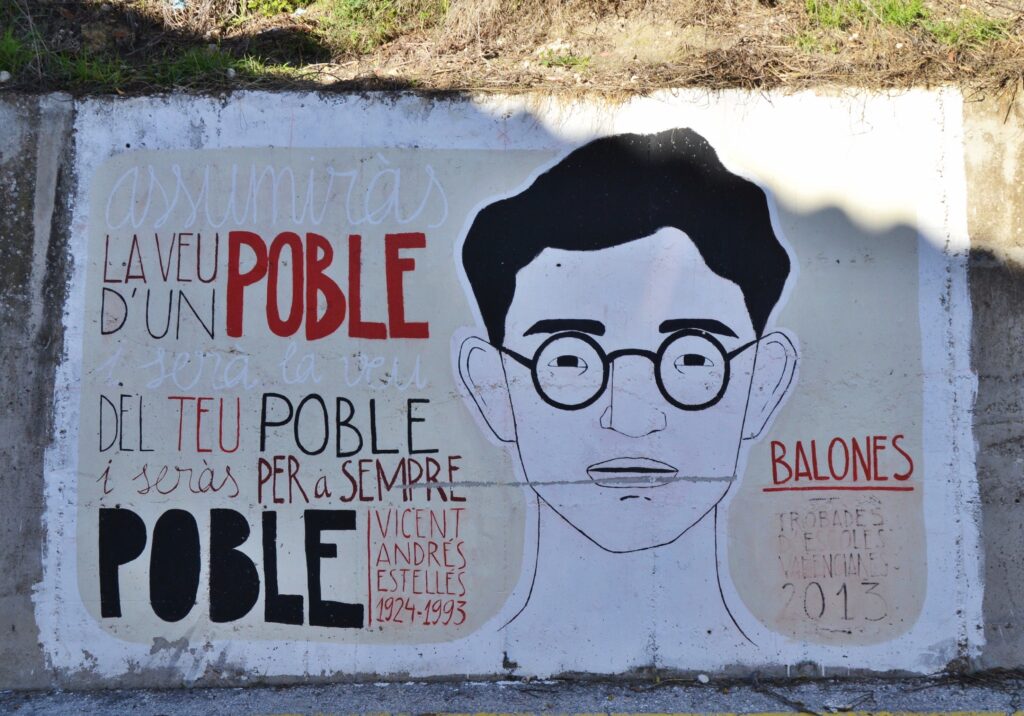Vicent Andrés Estellés: Memory as Resistance
This month marks the centenary celebrations for the Valencian poet Vicent Andrés Estellés (1924-1993), born 100 years ago on September 4, 1924. While he is widely considered the greatest poet in the modern history of the Valencian language, the political Right seems bent on silencing his legacy.
In February, the center-right Partido Popular (PP) and far-right Vox, which in Valencia and elsewhere are trying to turn back the progressive memory policies instituted in recent years, teamed up to deny Vicent Estellés his centenary, branding him a Catalan nationalist. The truth is different. Not only is the poet a threat to the Right’s monolingual Spanish identity, but his work also recalls the brutal reality of the Franco dictatorship. Simply put, the PP and Vox would rather we forget. Remembering Estellés, his experiences, his literary work and legacy provides an invaluable resource for Valencians to construct our identity and understand not only who we are but what our experiences collectively have been. Forgetting Estellés, by contrast, serves to deny Valencian identity and provoke the further alienation of Valencians from themselves.
Estellés was born in Burjassot, a town just to the north of the Valencian capital, connected today by a tram route named in the poet’s honor. The son of the town’s baker, Estellés experienced the outbreak of the Spanish Civil War as a young boy at the same time as he began writing his first poems and plays. He immersed himself in the books of a neighbor and watched with horror as many volumes were destroyed for legitimate fear of repression following the fascist takeover. Because Estellés did not go into exile, his work provides a window into the realities of the Franco regime. He first worked as a baker, like his father, then dabbled in a variety of labor trades before deciding to study journalism. While studying journalism, he published his first poems, a collection of Spanish translations of poems he originally wrote in Valencian. He worked as head editor of Valencian newspaper Las Provincias for 30 years, starting in 1948, while also publishing many poetry collections. He married in 1955 and the couple suffered the death of their first child at just four months. The tragedy marked Estellés forever.
Estellés suffered linguistic oppression and censorship, with many texts only coming to light posthumously—indeed, thirty years after his death, much of it is still forthcoming. Estellés over time felt increasingly empowered to write about these difficult experiences, as he found his voice as a representative of his people, the Valencians. His greatest work is perhaps “Mural del País Valencià” (Mural of the Valencian Country), an ambitious project made up of 27 collections across three volumes that sought to capture everything about the Valencian Country. “Mural” would only begin to see the light in 1978 after Franco’s death and the Transition.
The war and dictatorship are deeply woven through his work, along with the themes of love and death. In the gut-wrenching poem “A mi acorda un dictat” (“I’m Reminded of a Dictation”) Estellés uncovers his own traumatic memories of the Civil War. Here is a fragment (the translation is mine):
You have followed the road
made by the train, grimly, burning through la Mancha
—in Chinchilla they loaded the prisoners with their hands
knotted with chords; it was midnight:
tight, against their clothing, beards from so many days,
the repugnance of hunger, and also the repugnance
of waiting in fear, of the smell of war,
of trucks and trenches, of that precarious ranch
of chickpeas and dirty water (…)
As if instead of the prison those men came out
from the trench or from an improvised shelter
without understanding anything, barely questioning
«I was in Badajoz and what am I going to say…»
«What I saw on the Ebro…», «It was barbarity» , (…)
«I only remember the fear»
«I spent the war reading, in an attic
(so that the beasts of the village would not kill me),
The Criterion of (Jaime Luciano) Balmes again and again…»
«I was ten years old…» «Very hungry, very afraid»
The poem “Declaració de principis” (“Declaration of Principles”), published posthumously in 1996, underscores the indistinguishable barbarity between the war and the post-war years:
I come from a town, Burjassot, from neatly swept and mopped streets
that never recovered from the horror of the war
that kingdom of dead, those of the war and the post-war,
I went out, taking careful steps,
full of kisses and wounds,
without comprehending anything or understanding anything.
Estellés also penned several poems that pay homage to well-known literary figures who died during the Spanish Civil War period: Federico García Lorca, Antonio Machado (who sought refuge in Rocafort, Valencia, practically neighboring Estellés’ hometown Burjassot), and fellow Valencian poet Miguel Hernández, a Communist who died of tuberculosis in a Francoist prison in 1942.
Hernández’s centenary, widely celebrated in 2010, brought him and his work back into the forefront of public consciousness. Estellés, too, can be brought to the light. Fortunately, despite the lack of institutional support, the people of Valencia have taken up his banner. Musical tributes by Valencian artists such as Pau Alabajos, Obrint Pas, Xavi Sarria, Mar Morález, and bérnia are only one indicator. The fight for historical memory includes fighting for literary memory to defeat the sinister attempts by the Spanish right to turn back clocks and close access to the book of the past.
Dean Burrier Sanchis is a high school Spanish teacher and former soccer coach at Elk Grove High School. His Spanish-born grandfather, Vicente Sanchis Amades, was a member of the Abraham Lincoln Brigade.













